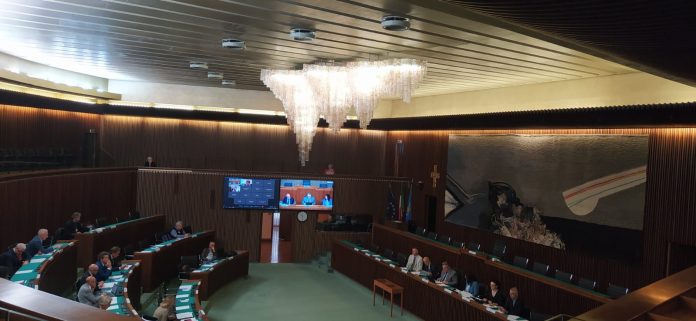by EH
The Fifth Commission convened this week to begin hearings with stakeholders as part of the 2024 European Session. The initiative aims to collect requests from the regional community and incorporate them into a resolution for review and voting in subsequent Commission meetings and the Assembly.
The session commenced with a somber tone as a minute of silence was observed in memory of the young victims of the recent Natisone flood, following a proposal by the President of the Fifth Commission.
The initial hearings featured prominent voices from the research, education, and training sectors. The Rector of the University of Udine underscored the urgency of developing technologies for food safety and quality, reducing waste, and lowering CO2 emissions through environmentally sustainable production systems. He called for stronger European institutional support for the digitalization of public administration and investment in health plans focused on active aging.
Echoing these sentiments, representatives from the Experimental Zooprophylactic Institute of the Venezie highlighted the critical need for EU support in reducing antibiotic use. They advocated for innovative systems and sensors in livestock farming to detect diseases early and monitor animal welfare.
The Regional Student Council, represented by its deputy coordinator, proposed the experimental development of a European student council. This initiative aims to enhance youth participation in dialogue and the exchange of project ideas. Meanwhile, officials from the Regional School Office illustrated how local schools are integrating European themes, with a particular focus on the green deal and digital system development.
In the realm of scientific research and innovation, the Area Science Park’s director highlighted key interests for the research center and its collaborators. These include infrastructure for hydrogen supply and transport, enhanced digital infrastructures, and investments in advanced materials for microscopic and spectroscopic investigations. Notably, the Friuli Venezia Giulia Region has already allocated funds from the National Recovery and Resilience Plan (PNRR) for these initiatives.
ARPA, addressing investments and environmental monitoring strategies, stressed the necessity for adequate regulations to develop and utilize wind energy packages within the regional territory. Their requests included updating climate scenarios and developing systems for interoperability and sharing of environmental information among various responsible entities.
The International Centre for Genetic Engineering and Biotechnology called for greater European openness to using modified crops in water resource management and streamlining entry procedures for qualified personnel from abroad. The Centre also recommended long-term financial support for platforms dedicated to the surveillance of emerging diseases.
As the hearings progress, the Fifth Commission aims to synthesize these diverse inputs into actionable resolutions that reflect the needs and ambitions of the regional community, ensuring their voices are heard in the broader European context.





























